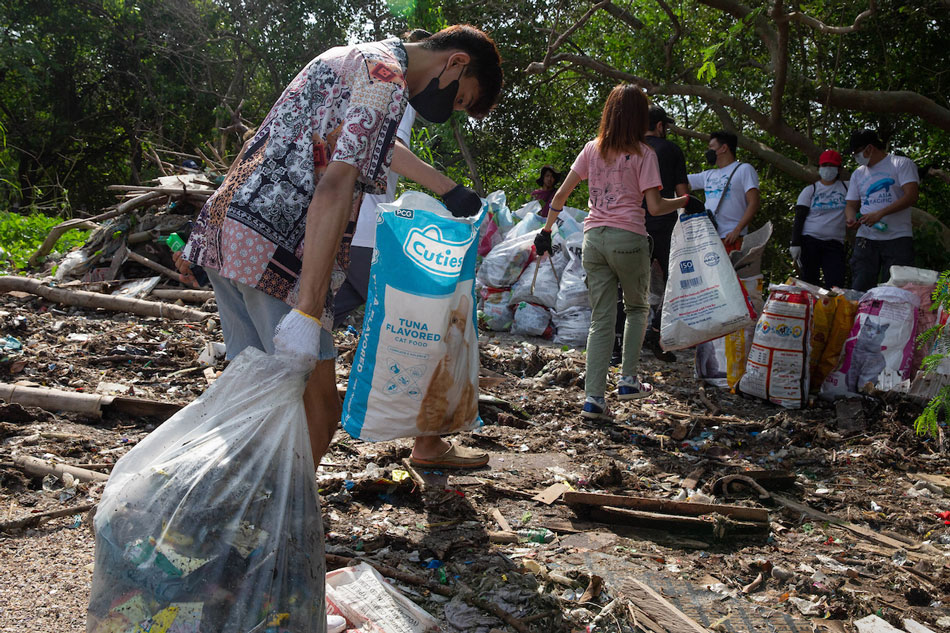COVID pandemic led to surge of medical waste: DOH | ABS-CBN
ADVERTISEMENT

Welcome, Kapamilya! We use cookies to improve your browsing experience. Continuing to use this site means you agree to our use of cookies. Tell me more!
COVID pandemic led to surge of medical waste: DOH
COVID pandemic led to surge of medical waste: DOH
Michael Delizo,
ABS-CBN News
Published Dec 16, 2022 06:32 PM PHT
MANILA — The COVID-19 pandemic has led to a rise in the amount of medical waste in the country that is harming human health and has adverse effects on the environment, officials said Friday.
MANILA — The COVID-19 pandemic has led to a rise in the amount of medical waste in the country that is harming human health and has adverse effects on the environment, officials said Friday.
Department of Health officer-in-charge Undersecretary Maria Rosario Vergeire said the COVID-19 response exacerbated the problem on healthcare waste due to the unprecedented increase in the use of various healthcare products.
Department of Health officer-in-charge Undersecretary Maria Rosario Vergeire said the COVID-19 response exacerbated the problem on healthcare waste due to the unprecedented increase in the use of various healthcare products.
“Healthcare waste management remains to be a critical concern not just in the Philippines, but also globally as healthcare wastes pose adverse effects to the health of people and, of course, our environment," she said.
“Healthcare waste management remains to be a critical concern not just in the Philippines, but also globally as healthcare wastes pose adverse effects to the health of people and, of course, our environment," she said.
Citing data from the Asian Development Bank, United Nations Development Programme (UNDP) Deputy Resident Representative to the Philippines Edwine Carrie said there was about 280 additional metric tons of medical waste being produced every day in Metro Manila as of April 20, 2020.
Citing data from the Asian Development Bank, United Nations Development Programme (UNDP) Deputy Resident Representative to the Philippines Edwine Carrie said there was about 280 additional metric tons of medical waste being produced every day in Metro Manila as of April 20, 2020.
ADVERTISEMENT
A year later, the Department of Environment and Natural Resources estimated that 52,000 metric tons of waste were generated in the Philippines since the lockdown, Carrie noted.
A year later, the Department of Environment and Natural Resources estimated that 52,000 metric tons of waste were generated in the Philippines since the lockdown, Carrie noted.
"Medical waste, especially infectious medical waste, remains among the most critical challenges for health systems, including in the Philippines,” said Carrie.
"Medical waste, especially infectious medical waste, remains among the most critical challenges for health systems, including in the Philippines,” said Carrie.
“This number [is] quite remarkable. And what they tell us is that if medical waste is not strictly managed and properly treated, it may create drastic pollution in water, air, and soil with the potential to spread diseases,” he added.
“This number [is] quite remarkable. And what they tell us is that if medical waste is not strictly managed and properly treated, it may create drastic pollution in water, air, and soil with the potential to spread diseases,” he added.
The UNDP is currently holding a project, titled “Learning Experience to Improve the Ability of Respomse to COVID-19 in Asia and the Pacific,” aimed at improving the Philippine response to COVID-19 in the areas of medical waste management.
The UNDP is currently holding a project, titled “Learning Experience to Improve the Ability of Respomse to COVID-19 in Asia and the Pacific,” aimed at improving the Philippine response to COVID-19 in the areas of medical waste management.
Funded by the South-South Cooperation Fund, the project facilitates provision of technical support and training of healthcare professionals on healthcare management.
Funded by the South-South Cooperation Fund, the project facilitates provision of technical support and training of healthcare professionals on healthcare management.
ADVERTISEMENT
The project upholds the goals of Universal Health Care in the context of an evolving pandemic response, recognizing that effective medical waste management is an essential public health service, and ensuring that investments in resilient health systems involves the need to invest in underlying systems that support a strong healthcare workforce and waste infrastructure.
The project upholds the goals of Universal Health Care in the context of an evolving pandemic response, recognizing that effective medical waste management is an essential public health service, and ensuring that investments in resilient health systems involves the need to invest in underlying systems that support a strong healthcare workforce and waste infrastructure.
Several equipment, which will be distributed to hospitals and facilities, have been donated to the Philippine government.
Several equipment, which will be distributed to hospitals and facilities, have been donated to the Philippine government.
On Friday, a hand-over ceremony of autoclave machine and other equipment for waste treatment at Dr. Jose N. Rodriguez Memorial Hospital (Tala Hospital) in Caloocan City was conducted.
On Friday, a hand-over ceremony of autoclave machine and other equipment for waste treatment at Dr. Jose N. Rodriguez Memorial Hospital (Tala Hospital) in Caloocan City was conducted.
The same equipment will also be handed over to Pasig City General Hospital.
The same equipment will also be handed over to Pasig City General Hospital.
“All bigger facilities in the country should have this kind of equipment or technologies so that we can minimize our generation of these infectious wastes, prevent also the dumping of unhealthy waste in our environment,” Vergeire said.
“All bigger facilities in the country should have this kind of equipment or technologies so that we can minimize our generation of these infectious wastes, prevent also the dumping of unhealthy waste in our environment,” Vergeire said.
ADVERTISEMENT
ADVERTISEMENT



